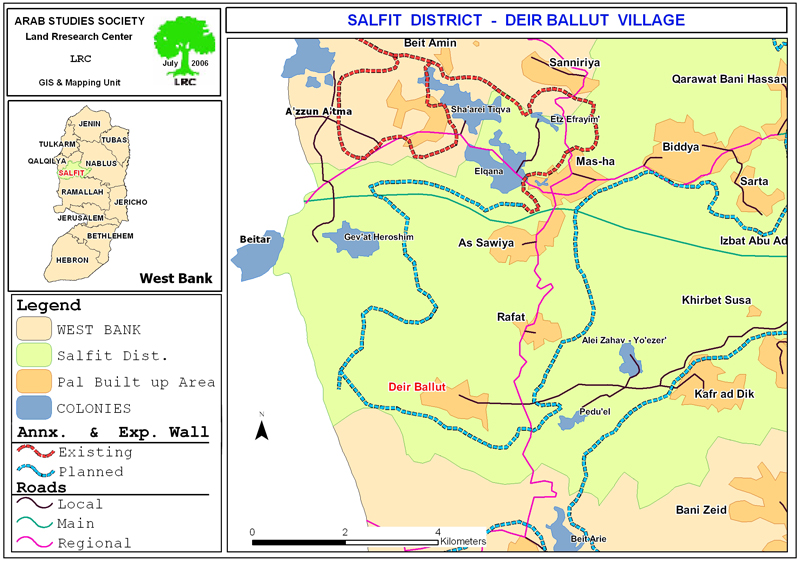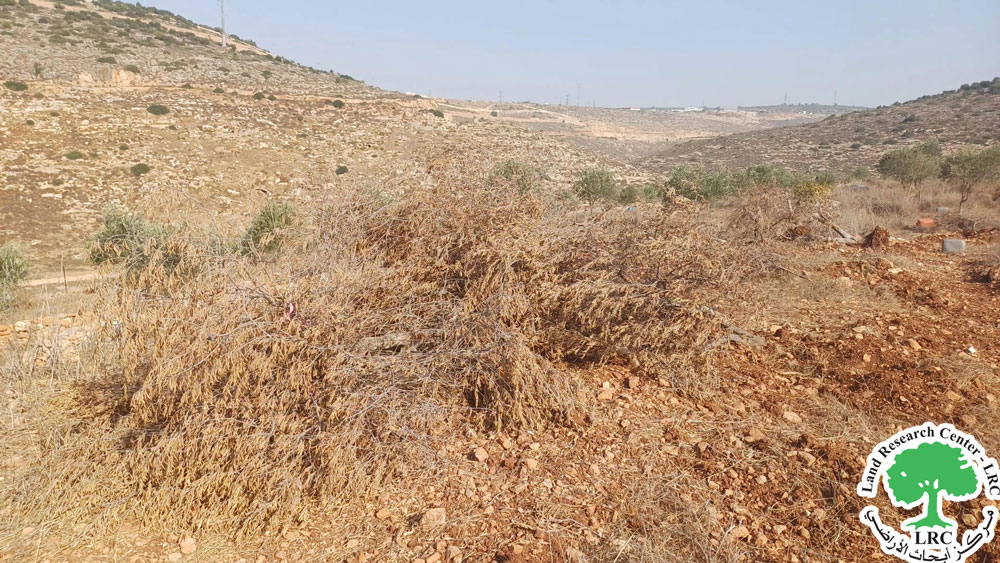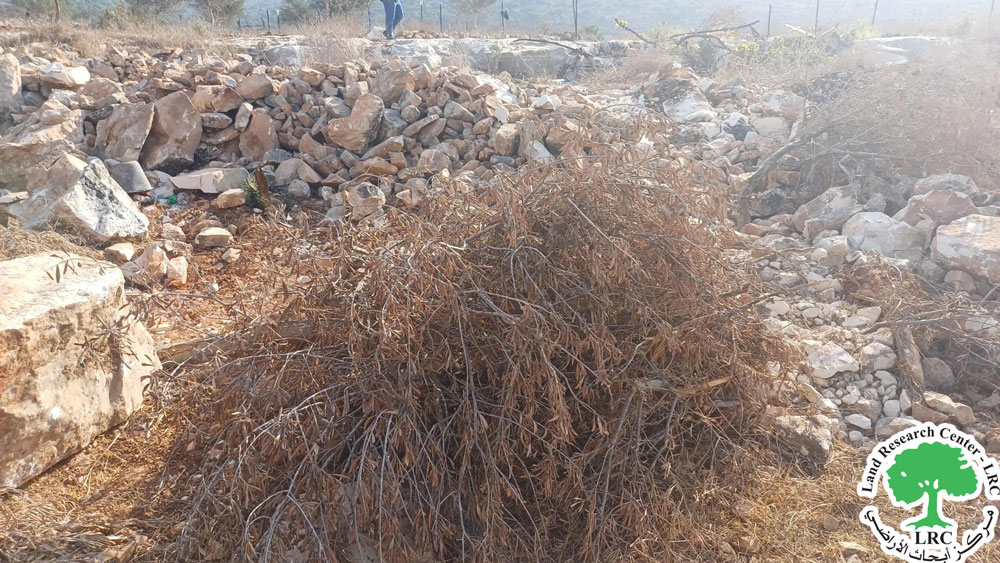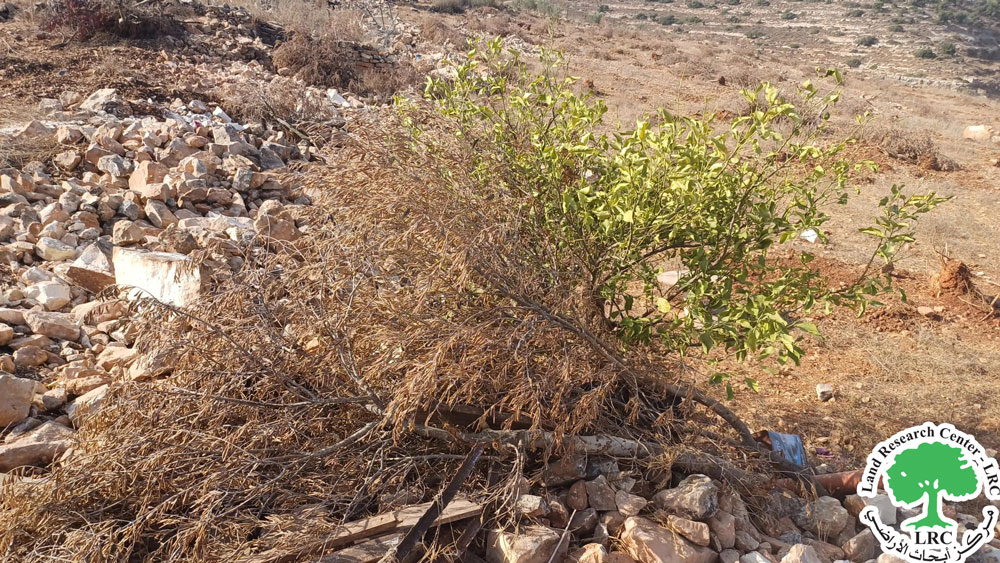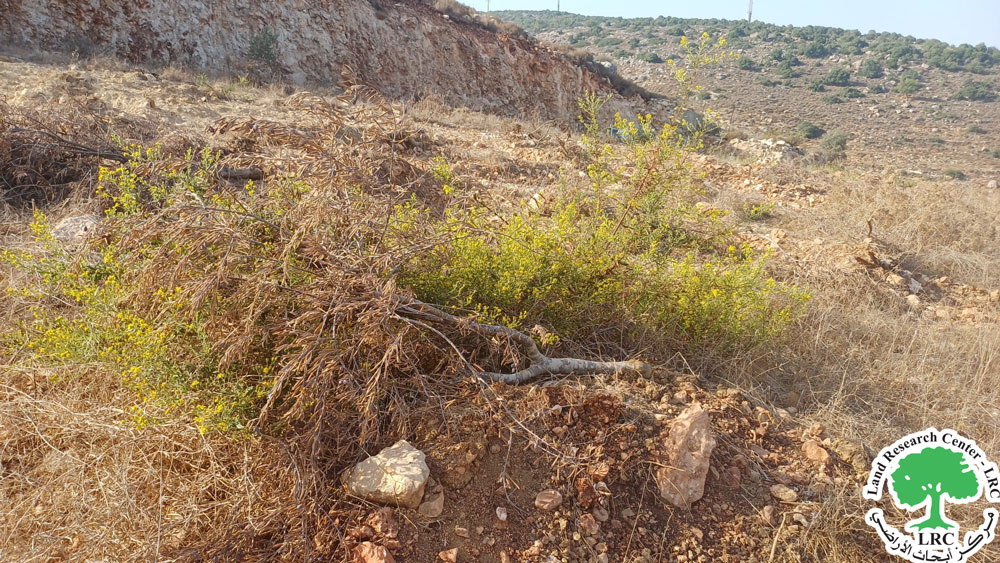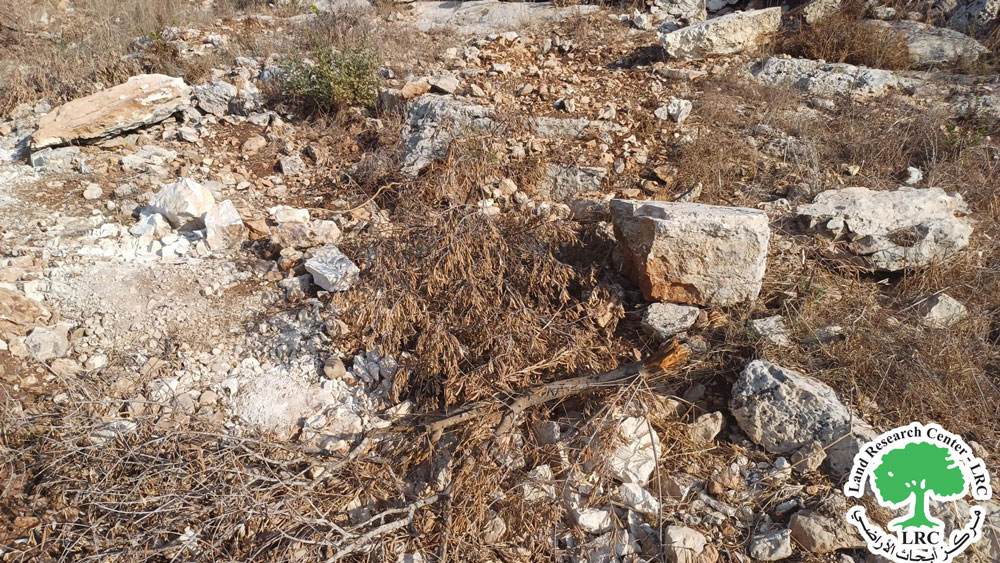Settlers from the "Ibn Haiber" Outpost Cut Down 108 Olive Trees in DeirIstiya / Salfit Governorate
Violation: Cutting olive trees during the harvest season.
Location: The town of DeirIstiya, north of Salfit city.
Date of Violation: November 1, 2024.
Perpetrators: A group of settlers from the "Ibn Haiber" pastoral outpost.
Affected Party: Farmer Naseem Mohammed Abdullah Obeid.
Description:
The current 2024 olive harvest season has witnessed intense attacks by settlers, who, throughout this season, have escalated their assaults on olive trees, stolen olives, and even attacked the farmers themselves by surrounding them and forcing them to leave the area.
A group of extremist settlers, coming from the "Ibn Haiber" outpost located in the "Al-Qidah" area north of DeirIstiya, stormed a 10-dunum plot of olive trees, owned by farmer Naseem Mohammed Abdullah Obeid. Naseem supports a family of (8), including (3) females and (3) children.
The affected farmer reported to the LRC researcher the following:
"On Friday morning, I went to my land located in the Al-Qidah area, where an outpost has been established just 150 meters away. This outpost, which was set up two years ago, has been a constant threat to us in the area. I have not been able to access this plot for over a year due to the occupation's restrictions. When I arrived, I was shocked to see that (108) olive trees, each 10 years old, had been cut down and completely destroyed, after the settlers had stolen the olives. It seems that this attack is not recent, as the trees are dry and withered, suggesting that the attack took place more than four months ago. This plot used to produce no less than 10 tins of olive oil annually."
Over the past two years, we have been attacked multiple times by settlers. The settlers previously cut down olive trees in a neighboring plot of land and also stole olives from it.
It is important to note that since the establishment of the pastoral outpost near the "Al-Qidah" area, the entire region has witnessed repeated attacks by settlers. Going to this area has become fraught with daily risks and difficulties for farmers. Several violations have been documented, mostly focusing on the destruction of agricultural lands, trees, and the daily harassment and terror inflicted by settlers in the area.
Deir Istiya Village:[1]
DeirIstiya village is located 10 km to the north of Salfit city. It is bordered to the north by Imatin, Jinsafot, and Kofr Laqif; to the west by Azoun and Kofr Thulth; to the east by Zita Jamma'in and Kifl Haris; and to the south by Haris and Qarawat Bani Hassan.
The village had a population of 3,696 residents as of 2017.
Its total area is 34,125 dunams, of which 640 dunams are designated for construction purposes.
The Israeli occupation has confiscated 4,257 dunams of its land, as detailed below:
- Israeli settlements have stolen 4,024 dunams from the village’s land. These are:
Colony Name | Established year | Area of Confiscated Land / dunams | Colonists Number | The extent of settler seizure of village lands |
Rfafa | 1991 | 167 | 2664 |
|
Yakeer | 1981 | 757 | 2341 | Entire settlement |
Jenat Shamron( | 1985 | 944 | NA |
|
Karni Shamron( | 1978 | 540 | 8388 |
|
Nofem | 1986 | 663 | 867 | Entire settlement |
Amanouel | 1981 | 879 | 4220 |
|
Maaleh Shamron | 1980 | 52 | 1002 |
|
Almattan | 1981 | 22 | NA | Entire Settlement |
2- The bypass roads numbered 55 and 5066 have confiscated 118 dunams.
3- The existing apartheid wall has confiscated (115) dunams along its path, with a total length of (1,148) meters. If the wall is completed, it will isolate (8,408) dunams and destroy (160) dunams.
According to the Oslo Agreement, the village's lands are classified as follows:
- Area classified as B: 6,132 dunams.
- Area classified as C: 27,993 dunams.
Attacking Trees... A Form of Israeli Violations of Palestinian Environment:
The frequency of attacks by settlers and the military on Palestinian trees has been increasing. According to the field research team at the Land Research Center, since the beginning of 2024 until October 31, 2024, the occupation has targeted more than 57,323 trees and saplings, marking the highest number in the past 10 years. Of these trees, 90% have been completely destroyed, which signals a real environmental disaster.
The loss of trees, whether by cutting, burning, or poisoning, results in a reduction in the number of trees, leading to a decrease in vegetation cover. This, in turn, reduces the amount of oxygen produced in the region and increases the concentration of carbon dioxide. Moreover, the destruction of trees leaves animals without shelter or food, threatening the extinction of certain species due to the destruction of their natural habitat, which harms biodiversity.
Legal Commentary:
The Palestinian environment, in general, is subjected to numerous environmental violations by the Israeli occupation, blatantly disregarding all international and national laws and conventions related to the protection of environmental rights. The right to live in a clean and healthy environment is an inherent right for every human being since creation. The occupation often attempts to portray itself as concerned with international environmental issues, despite signing major environmental protection agreements, including the Basel Convention in 1989, the Rotterdam Convention in 2008, the Stockholm Convention in 2001, and the Ramsar Convention in 1971, as well as air quality and climate protocols. Despite this, Israel continuously violates all of these treaties without accountability or oversight.
In addition to the provisions related to the right to enjoy a clean and healthy environment for all those under military occupation, according to international laws, conventions, and treaties, such as the International Covenant on Economic, Social, and Cultural Rights, adopted by the United Nations General Assembly resolution 2200 A (d-21) dated December 16, 1966, Article 1, paragraph 2 states:
"... All peoples have the right to freely pursue their economic, social, and cultural development, and the right to freely dispose of their natural wealth and resources without prejudice to any obligations arising from the international economic cooperation based on the principle of mutual benefit and international law. In no case may a people be deprived of its own means of subsistence..."
There is no doubt that the violations carried out by the Israeli side violate the laws of the "occupying power" before any other laws. Referring to the details of this case, the Israeli Penal Code of 1977 and its amendments stipulate that trespassing on the property of others to commit a criminal act punishable by law is an offense. Article 447 states:
"Anyone who does any of the following with the intent to intimidate, insult, or harass the property owner, or to commit a crime, shall be punished with imprisonment for two years:
(1) Enters or crosses the property;
(2) After entering the property legally, remains there unlawfully.
(b) A crime under this section is committed when the offender carries a firearm or a bladed weapon. The penalty for this is imprisonment for four years."
By reading the text of this article, we find that the Israeli Penal Code criminalizes merely entering someone else's property without justification, with the intent to insult, harass, or intimidate, and punishes this act with imprisonment for two years. The penalty is increased when the offender enters the property and commits a crime using a weapon or a sharp tool, or engages in any other form of violation, such as using the land as if it were their own and working it as they wish. This is explicitly criminalized in the aforementioned provision of the Israeli Penal Code.
Therefore, the Israeli aggressor, by cutting the trees, caused severe environmental pollution in the area, violating, without any justification, what is stated in international laws and treaties, as well as in the internal laws of the "occupying state," in clear violation. Consequently, the "Israeli judiciary" must hold the settlers accountable and punish them for these actions in accordance with their legal provisions. However, there has been no legal accountability for the aggressor by the Israeli judiciary. Nonetheless, this does not negate the right of any person on this land to live in a clean, healthy, and safe environment free from any violation or aggression against it.
- مشروع: حماية الحقوق البيئية الفلسطينية في مناطق "ج" SPERAC IV - GFFO
Disclaimer: The views and opinions expressed in this report are those of Land Research Center and do not necessarily reflect the views or positions of the project donor; the Norwegian Refugee Council.
إخلاء المسؤولية: الآراء ووجهات النظر الواردة في هذا التقرير هي آراء ووجهات نظر مركز أبحاث الأراضي ولا تعكس بالضرورة وجهات نظر أو مواقف الجهة المانحة للمشروع؛ المجلس النرويجي. للاجئين
